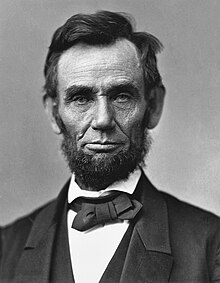
Back Abraham Lincoln ACE Abraham Lincoln Afrikaans Abraham Lincoln ALS አብርሀም ሊንከን Amharic Aparaham Linken AMI Abraham Lincoln AN Abraham Lincoln ANG أبراهام لينكون Arabic أبراهام لينكولن ARY ابراهام لينكولن ARZ
Abraham Lincoln | |
|---|---|
 Lincoln in November 1863 | |
| 16th President of the United States | |
| In office March 4, 1861 – April 15, 1865 | |
| Vice President |
|
| Preceded by | James Buchanan |
| Succeeded by | Andrew Johnson |
| Member of the U.S. House of Representatives from Illinois's 7th district | |
| In office March 4, 1847 – March 3, 1849 | |
| Preceded by | John Henry |
| Succeeded by | Thomas L. Harris |
| Member of the Illinois House of Representatives from Sangamon County | |
| In office December 1, 1834 – December 4, 1842 | |
| Preceded by | Achilles Morris |
| Personal details | |
| Born | February 12, 1809 Hodgenville, Hardin County (now LaRue County, Kentucky), U.S. |
| Died | April 15, 1865 (aged 56) Washington, D.C., U.S. |
| Manner of death | Assassination by gunshot |
| Resting place | Lincoln Tomb |
| Political party |
|
| Other political affiliations | National Union (1864–1865) |
| Height | 6 ft 4 in (193 cm)[1] |
| Spouse | |
| Children | |
| Parents | |
| Relatives | Lincoln family |
| Occupation |
|
| Signature | |
| Military service | |
| Branch/service | Illinois Militia |
| Years of service | April–July 1832 |
| Rank | |
| Unit | 31st (Sangamon) Regiment of Illinois Militia 4th Mounted Volunteer Regiment Iles Mounted Volunteers |
| Battles/wars |
|
Abraham Lincoln (/ˈlɪŋkən/ LINK-ən; February 12, 1809 – April 15, 1865) was the 16th president of the United States, serving from 1861 until his assassination in 1865. He led the United States through the American Civil War, defending the nation as a constitutional union, defeating the Confederacy, playing a major role in the abolition of slavery, expanding the power of the federal government, and modernizing the U.S. economy.
Lincoln was born into poverty in a log cabin in LaRue County, Kentucky and was raised on the frontier, mainly in Indiana. He was self-educated and became a lawyer, Whig Party leader, Illinois state legislator, and U.S. representative from Illinois. In 1849, he returned to his successful law practice in Springfield, Illinois. In 1854, angered by the Kansas–Nebraska Act, which opened the territories to slavery, he re-entered politics. He soon became a leader of the new Republican Party. He reached a national audience in the 1858 Senate campaign debates against Stephen A. Douglas. Lincoln ran for president in 1860, sweeping the North to gain victory. Pro-slavery elements in the South viewed his election as a threat to slavery, and Southern states began seceding from the nation. They formed the Confederate States of America, which began seizing federal military bases in the South. A little over one month after Lincoln assumed the presidency, Confederate forces attacked Fort Sumter, a U.S. fort in South Carolina. Following the bombardment, Lincoln mobilized forces to suppress the rebellion and restore the union.
Lincoln, a moderate Republican, had to navigate a contentious array of factions with friends and opponents from both the Democratic and Republican parties. His allies, the War Democrats and the Radical Republicans, demanded harsh treatment of the Southern Confederates. He managed the factions by exploiting their mutual enmity, carefully distributing political patronage, and by appealing to the American people. Anti-war Democrats (called "Copperheads") despised Lincoln, and some irreconcilable pro-Confederate elements went so far as to plot his assassination. His Gettysburg Address became one of the most famous speeches in American history. Lincoln closely supervised the strategy and tactics in the war effort, including the selection of generals, and implemented a naval blockade of the South's trade. He suspended habeas corpus in Maryland and elsewhere, and he averted war with Britain by defusing the Trent Affair. In 1863, he issued the Emancipation Proclamation, which declared the slaves in the states "in rebellion" to be free. It also directed the Army and Navy to "recognize and maintain the freedom of said persons" and to receive them "into the armed service of the United States." Lincoln pressured border states to outlaw slavery, and he promoted the Thirteenth Amendment to the U.S. Constitution, which abolished slavery, except as punishment for a crime. Lincoln managed his own successful re-election campaign. He sought to heal the war-torn nation through reconciliation. On April 14, 1865, just five days after the Confederate surrender at Appomattox, he was attending a play at Ford's Theatre in Washington, D.C., with his wife, Mary, when he was fatally shot by Confederate sympathizer John Wilkes Booth.
Lincoln is remembered as a martyr and a national hero for his wartime leadership and for his efforts to preserve the Union and abolish slavery. He is often ranked in both popular and scholarly polls as the greatest president in American history.
| ||
|---|---|---|
|
Personal Political 16th President of the United States First term Second term Presidential elections Speeches and works
Assassination and legacy  |
||
- ^ Carpenter, Francis B. (1866). Six Months in the White House: The Story of a Picture. Hurd and Houghton. p. 217.
Cite error: There are <ref group=lower-alpha> tags or {{efn}} templates on this page, but the references will not show without a {{reflist|group=lower-alpha}} template or {{notelist}} template (see the help page).
